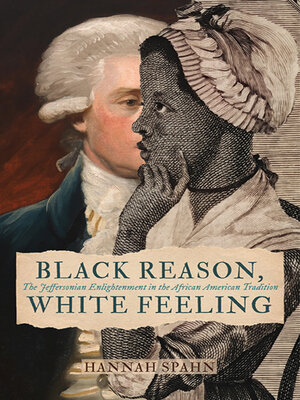Black Reason, White Feeling
ebook ∣ The Jeffersonian Enlightenment in the African American Tradition · Jeffersonian America
By Hannah Spahn

Sign up to save your library
With an OverDrive account, you can save your favorite libraries for at-a-glance information about availability. Find out more about OverDrive accounts.
Find this title in Libby, the library reading app by OverDrive.



Search for a digital library with this title
Title found at these libraries:
| Library Name | Distance |
|---|---|
| Loading... |
The vital influence of Black American intellectuals on the legacy of Thomas Jefferson's ideas
The lofty Enlightenment principles articulated by Thomas Jefferson in the Declaration of Independence, so central to conceptions of the American founding, did not emerge fully formed as a coherent set of ideas in the eighteenth century. As Hannah Spahn argues in this important book, no group had a more profound influence on their development and reception than Black intellectuals. The rationalism and universalism most associated with Jefferson today, she shows, actually sprang from critical engagements with his thought by writers such as David Walker, Lemuel Haynes, Frederick Douglass, and W. E. B. Du Bois.
Black Reason, White Feeling illuminates the philosophical innovations that these and other Black intellectuals made to build on Jefferson's thought, shaping both Jefferson's historical image and the exalted legacy of his ideas in American culture. It is not just the first book-length history of Jefferson's philosophy in Black thought; it is also the first history of the American Enlightenment that centers the originality and decisive impact of the Black tradition.
The lofty Enlightenment principles articulated by Thomas Jefferson in the Declaration of Independence, so central to conceptions of the American founding, did not emerge fully formed as a coherent set of ideas in the eighteenth century. As Hannah Spahn argues in this important book, no group had a more profound influence on their development and reception than Black intellectuals. The rationalism and universalism most associated with Jefferson today, she shows, actually sprang from critical engagements with his thought by writers such as David Walker, Lemuel Haynes, Frederick Douglass, and W. E. B. Du Bois.
Black Reason, White Feeling illuminates the philosophical innovations that these and other Black intellectuals made to build on Jefferson's thought, shaping both Jefferson's historical image and the exalted legacy of his ideas in American culture. It is not just the first book-length history of Jefferson's philosophy in Black thought; it is also the first history of the American Enlightenment that centers the originality and decisive impact of the Black tradition.







